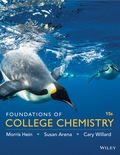
Concept explainers
(a)
Interpretation:
The Lewis structure of
Concept Introduction:
Lewis structure:
The representation of valence shell electrons around the atom is known as Lewis structure or Lewis dot structure. Electrons are represented as a dot in Lewis structures, a single dot represents unpaired electron and paired of dots represents paired electrons.
(b)
Interpretation:
The Lewis structure of trichloromethane has to be given.
Concept Introduction:
Refer part (a)
(c)
Interpretation:
The Lewis structure of Hydrogen Fluoride has to be given.
Concept Introduction:
Refer part (a)
(d)
Interpretation:
The Lewis structure of formaldehyde has to be given.
Concept Introduction:
Refer part (a)
(e)
Interpretation:
The Lewis structure of Nitrogen molecule has to be given.
Concept Introduction:
Refer part (a)
Want to see the full answer?
Check out a sample textbook solution
Chapter 11 Solutions
EBK FOUNDATIONS OF COLLEGE CHEMISTRY
- Draw Lewis structures for the following compounds and ions, showing appropriateformal charges.(a) [CH3OH2 ]+ (b) NH4Cl (c) (CH3)4NCl(d) NaOCH3 (e) +CH3 (f) -CH3(g) NaBH4 (h) NaBH3CN (i) (CH3)2O¬BF3(j) [HONH3]+ (k) KOC(CH3)3 (l) [H2C“OH]arrow_forwardWrite the Lewis structures for the following, and include resonance structures where appropriate. Indicate which has the strongest carbon-oxygen bond.(a) CO2(b) COarrow_forwardDraw a Lewis structure for each of the following molecules and ions. In each case, the atoms can be connected in only one way. (a) Br2 (b) H2S (c) N2H4 (d) N2H2 (e) CN- (f) NH4+ (g) N2 (h) O2arrow_forward
- Draw Lewis structures for the following compounds.(a) ammonia, NH3 (b) water, H2O(c) hydronium ion, H3O+ (d) propane, C3H8(e) dimethylamine, CH3NHCH3 (f) diethyl ether, CH3CH2OCH2CH3(g) 1-chloropropane, CH3CH2CH2Cl (h) propane-2-ol, CH3CH(OH)CH3(i) borane, BH3 (j) boron trifluoride, BF3Explain what is unusual about the bonding in the compounds in parts (i) and (j)arrow_forwardWrite Lewis formulas, including unshared pairs, for each of the following. Carbon has four bonds in each compound. (a) Propane (C3H8) (c) Methyl fluoride (CH3F) (b) Methanol (CH4O) (d) Ethyl fluoride (C2H5F)arrow_forward(a) Draw Lewis structure of the following: (i) H3PO4 (ii) N3 - (b) How many hydrogen atoms are present in 10 g of sugar? (c) Calculate formal charge of each atom of CH3O-arrow_forward
- Write Lewis structures for the following:(a) H2(b) HBr(c) PCl3(d) SF2(e) H2CCH2(f) HNNH(g) H2CNH(h) NO–(i) N2(j) CO(k) CN–arrow_forwardGive the Lewis structure of each of the following:(a) SF4(b) K2SO4(c) SO2Cl2(d) H2SO3(e) SO3arrow_forwardThe atomic number of sulfur is 16. Sulfur combines withhydrogen by covalent bonding to form a compound, hydrogensulfide. Based on the number of valence electrons in a sulfuratom, predict the molecular formula of the compound.(A) HS(B) HS2(C) H2S(D) H4Sarrow_forward
- Semustine is a chemotherapy drug, and exerts it's anticancer activity by damaging the DNA of the cancer cells. Predict the approximate bond angle, (c) in Semustine and the molecular geometry of the indicated oxygen (a) and nitrogen (b) atoms. (a) NH (c) CH (b) Semustine NINAarrow_forwardDraw Lewis structures for the following molecules and ion. (c) H2O2 (a) NCl3 (b) OCS (d) HCOO−arrow_forwardAssign formal charges to all atoms in the following Lewis diagrams. (a) ClO, :ö: (b) SO2 ö-s=0 :ö-Cl-ö: :0: (e) BrO5 :0-Br-ö: (d) NOŽ ö=N-ö: :0:arrow_forward
 Introduction to General, Organic and BiochemistryChemistryISBN:9781285869759Author:Frederick A. Bettelheim, William H. Brown, Mary K. Campbell, Shawn O. Farrell, Omar TorresPublisher:Cengage Learning
Introduction to General, Organic and BiochemistryChemistryISBN:9781285869759Author:Frederick A. Bettelheim, William H. Brown, Mary K. Campbell, Shawn O. Farrell, Omar TorresPublisher:Cengage Learning
